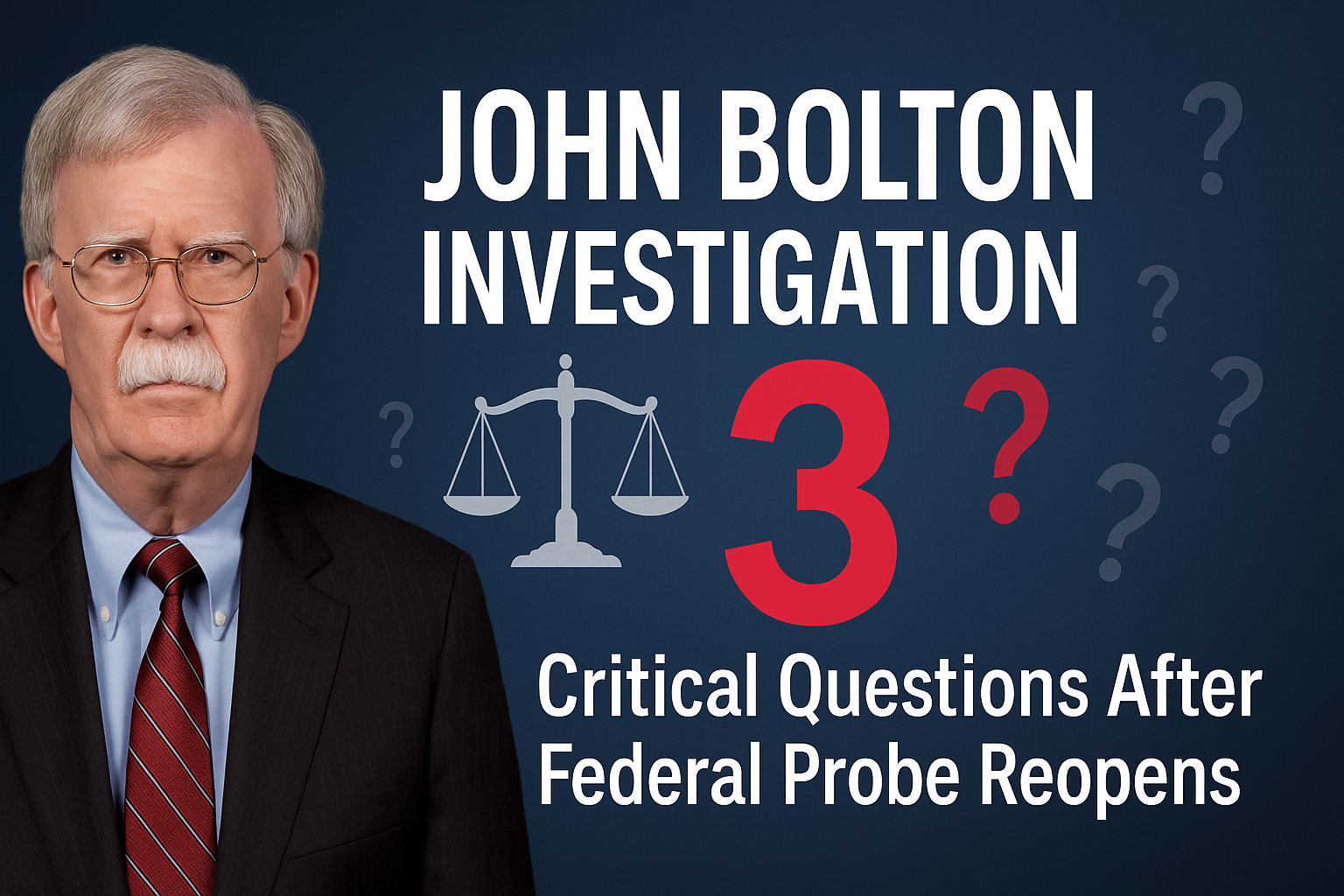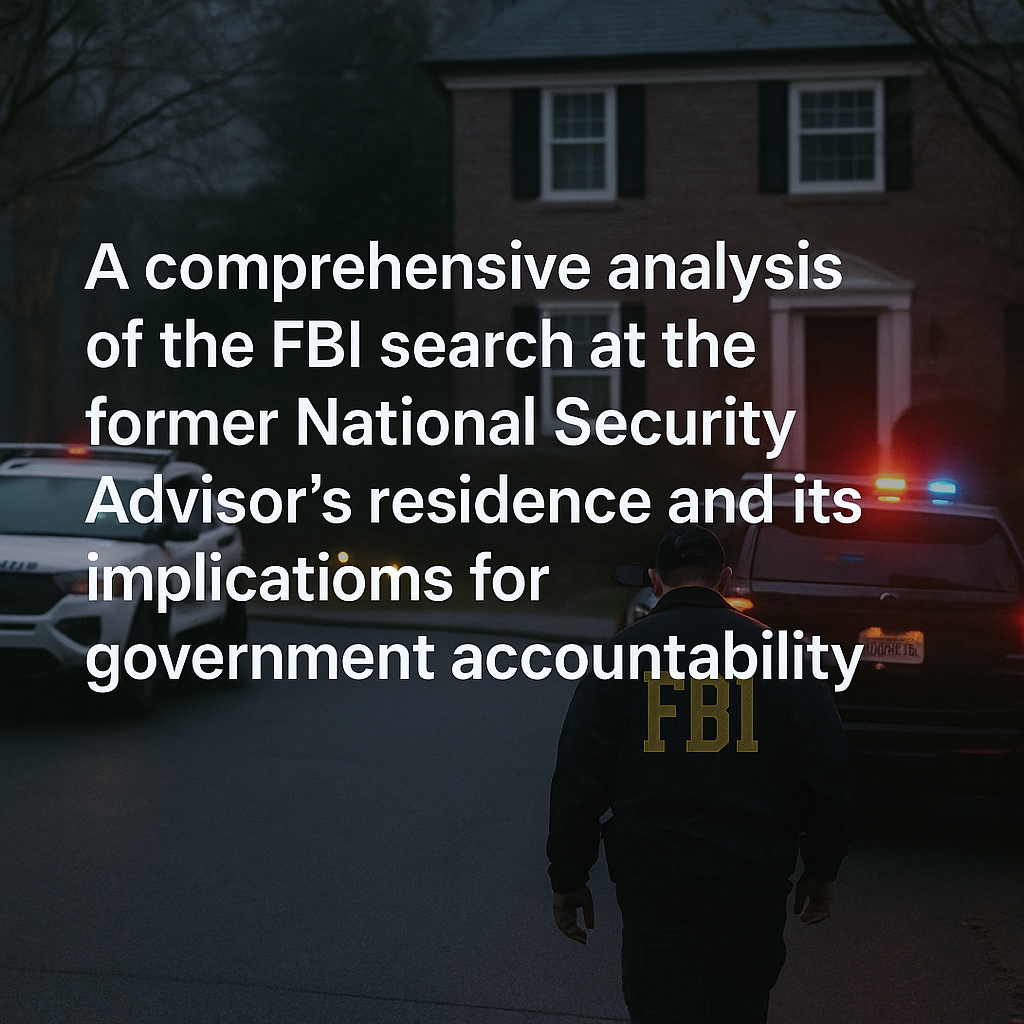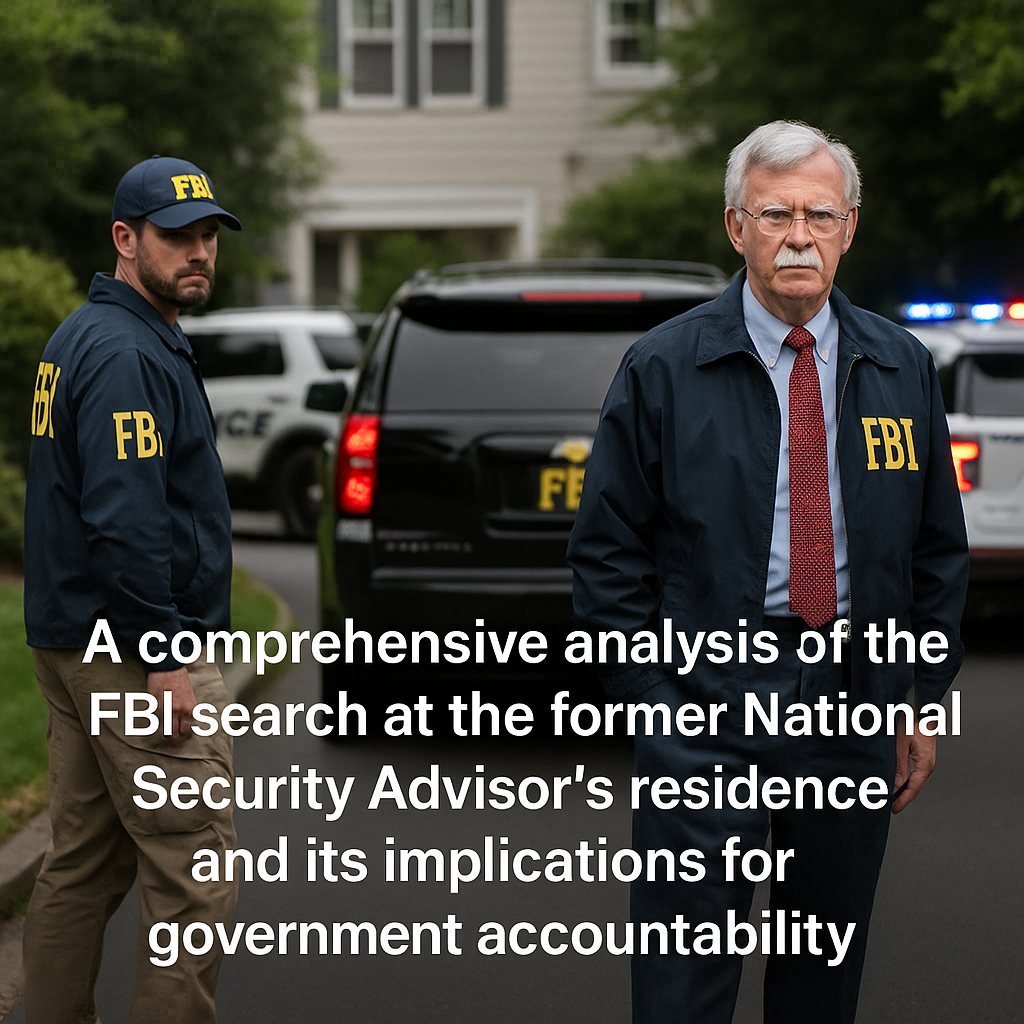
A comprehensive analysis of the FBI search at the former National Security Advisor’s residence and its implications for government accountability
Executive Summary
On a quiet Thursday morning in Bethesda, Maryland, federal agents executed a search warrant at the residence of John Bolton, former National Security Advisor under President Donald Trump. The dawn operation, which involved both FBI agents and local Montgomery County police support, marks the reopening of a criminal investigation that was previously closed by the Biden administration’s Department of Justice in 2021. This development raises significant questions about prosecutorial priorities, the weaponization of justice, and the complex intersection of national security law with political accountability.
The Dawn Raid: What Happened
At approximately 7:00 AM on Thursday morning, multiple law enforcement vehicles converged on Fernwood Road in Bethesda, Maryland, creating a scene that initially appeared to be a local police operation. However, the Montgomery County police presence served merely as support for the primary federal investigation being conducted by FBI agents positioned further down the street at Bolton’s residence.
The search warrant execution was conducted with the methodical precision typical of federal operations involving high-profile political figures. Witnesses observed FBI vehicles stationed strategically around the property while agents carried out their investigative duties inside the residence. The operation was livestreamed by observers, providing real-time documentation of this significant law enforcement action.
The timing and scale of the operation suggest this is not a routine matter but rather a deliberate and high-priority investigation that has captured the attention of senior Justice Department officials. The coordination between federal and local authorities indicates the seriousness with which current leadership is approaching this case.
Historical Context: The Bolton Book Controversy
To understand the current investigation, it’s essential to examine the complex timeline surrounding Bolton’s controversial memoir, “The Room Where It Happened,” published in 2020. This timeline reveals a pattern of administrative delays, political maneuvering, and legal challenges that provide crucial context for today’s developments.
Bolton’s Government Service

John Bolton served as President Trump’s third National Security Advisor, assuming the role on April 9, 2018, following the brief tenure of Mike Flynn and the tumultuous period under H.R. McMaster. Bolton’s appointment came during a particularly volatile period in Trump’s foreign policy apparatus, and his eventual resignation on September 10, 2019, marked the end of a relationship that had grown increasingly strained over policy disagreements.
During his 17-month tenure, Bolton was privy to highly sensitive national security information, classified briefings, and confidential presidential communications. His role placed him at the center of numerous controversial foreign policy decisions, including negotiations with North Korea, military actions in the Middle East, and the administration’s approach to various international crises.
The Prepublication Review Process
Following his departure from government service, John Bolton undertook the writing of his memoir, a common practice among former high-level officials. However, as a former government employee with access to classified information, John Bolton was legally required to submit his manuscript for prepublication review—a process designed to ensure that no classified material would be inadvertently disclosed to the public.
John Bolton complied with this requirement, submitting his manuscript to the National Security Council for the mandatory review. This process, while standard, became the source of significant controversy and legal complications that would eventually lead to the current criminal investigation.
The Review Timeline and Administrative Delays
The prepublication review process for Bolton’s manuscript became unusually protracted and contentious. After months of negotiations with Ellen Knight, the senior director for records access and information security management at the NSC, Bolton received what he claimed was oral approval to proceed with publication on April 27, 2020.
However, on May 2, 2020—just days after Bolton believed he had received clearance—the NSC’s senior director for intelligence initiated a “supplemental” review of the manuscript. This additional review layer caused further delays in the publication timeline and raised questions about whether the administration was using the review process to prevent Bolton’s criticisms of President Trump from reaching the public.
The supplemental review represented a significant escalation in the government’s scrutiny of Bolton’s manuscript. While such reviews are not unheard of, the timing and circumstances surrounding this additional layer of examination suggested possible political motivations rather than purely national security concerns.
The Legal Battle Intensifies
Government Attempts to Block Publication
As Bolton’s publication date approached, the legal battle intensified dramatically. By the time the government sought an injunction on June 17, 2020, Bolton’s book had already been printed, bound, and distributed to media outlets for advance reviews. This timing created a complex legal situation where the government was attempting to prevent the publication of material that was already in circulation.
President Trump personally involved himself in efforts to prevent Bolton’s book from reaching the public, directing his administration to pursue legal action to strip Bolton of all proceeds from book sales. This presidential involvement elevated what might have been a routine prepublication review dispute into a high-stakes political and legal confrontation.
Criminal Investigation Under Trump Administration
The civil litigation was followed by an even more serious development: the opening of a criminal investigation. In the fall of 2020, as the presidential election approached, John Demers, who headed the Justice Department’s national security division under Trump, opened a criminal investigation into Bolton’s conduct.
The criminal investigation included the empaneling of a grand jury to determine whether Bolton could be prosecuted for criminally disclosing classified information. This represented a significant escalation from civil litigation to potential criminal charges, carrying the possibility of substantial fines and imprisonment.
Biden Administration’s Decision to Drop the Case
Following the change in presidential administrations, the Justice Department under new leadership conducted its own review of the Bolton matter. In June 2021, the Biden administration’s Justice Department made the decision to drop the criminal investigation and end efforts to seize proceeds from Bolton’s book sales.
This decision was based on a comprehensive review of the evidence and legal considerations surrounding the case. The Biden administration’s Justice Department concluded that prosecution was not warranted given the circumstances of Bolton’s conduct and the complex procedural history of the prepublication review process.
Current Investigation: A Renewed Focus
Political Motivations and Scalp Hunting
The decision to reopen the John Bolton investigation appears to be part of a broader pattern of targeting former intelligence and national security officials who were critical of Trump during his first administration. Current Director of National Intelligence Tulsi Gabbard has characterized the Obama-era intelligence leadership as engaged in a “treasonous conspiracy,” setting the tone for aggressive investigations of Trump’s perceived enemies.
This renewed focus represents a dramatic shift from the previous administration’s approach to these matters. Rather than allowing closed cases to remain closed, the current Justice Department leadership appears determined to pursue investigations of high-profile critics, regardless of whether previous prosecutors found sufficient evidence to proceed.
The Scalp-Hunting Strategy
The current approach can be characterized as “scalp hunting”—a systematic effort to find prosecutable offenses among senior intelligence and national security officials who opposed or criticized Trump. This strategy appears to be driven more by political considerations than by traditional prosecutorial standards or the likelihood of successful convictions.
Vice President JD Vance’s comments suggesting that the investigation involves “classified documents” but also reflects “broad concerns” indicate that the current administration may be casting a wider net than the previous investigation. However, the lack of specific details about these “broader concerns” raises questions about whether this represents genuine new evidence or merely a more aggressive prosecutorial approach to the same underlying facts.
Legal Analysis: The Challenges Ahead
Statute of Limitations Concerns
One of the most significant challenges facing prosecutors in the Bolton case involves statute of limitations issues. The book was published five years ago, and most federal crimes have a five-year statute of limitations. While charging Bolton with conspiracy could potentially extend the limitations period somewhat, prosecutors would need to identify overt acts in furtherance of the conspiracy that occurred within the statutory timeframe.
The passage of time creates additional challenges for prosecution, as memories fade, documents may be lost or destroyed, and witnesses may become unavailable. These practical considerations make successful prosecution increasingly difficult as time passes.
The Prepublication Review Defense

Bolton has a potentially strong defense based on his compliance with the prepublication review process and the government’s handling of that review. His legal team can argue that he made good faith efforts to comply with his obligations and that the government’s dilatory and possibly bad faith review process justified his decision to proceed with publication.
The fact that Bolton received what he reasonably believed to be clearance from Ellen Knight, only to have a supplemental review initiated days later, supports an argument that the government was using the review process for political rather than national security purposes. This narrative could be compelling to a jury asked to determine whether Bolton’s conduct was criminal.
The Weaponization Defense
Perhaps Bolton’s strongest defense lies in arguing that the prepublication review process was weaponized against him to prevent criticism of the president. The timing of the supplemental review, coming after Bolton had received initial clearance and just as publication was imminent, suggests possible political motivation.
A jury might be sympathetic to an argument that Bolton was caught in an impossible situation: comply with a review process that appeared designed to prevent his legitimate criticism of government actions, or proceed with publication to ensure his First Amendment rights were protected.
Broader Implications for Justice Department Integrity
Prosecutorial Discretion and Political Influence
The Bolton case raises fundamental questions about prosecutorial discretion and the appropriate role of political considerations in charging decisions. When a previous Justice Department, after thorough investigation, declined to prosecute a case, the decision to reopen that investigation solely due to a change in political leadership undermines public confidence in the justice system’s independence.
Prosecutorial discretion has traditionally been exercised based on factors such as the strength of the evidence, the likelihood of conviction, the seriousness of the offense, and the interests of justice. Political considerations, while sometimes relevant, should not be the primary driver of prosecutorial decisions.
The Precedent for Future Administrations

The approach taken in the Bolton case sets a concerning precedent for future administrations. If each new administration can reopen criminal investigations that were previously closed by their predecessors, it creates a cycle of political retribution that undermines the rule of law and the stability of democratic institutions.
This precedent could lead to a system where former government officials are perpetually at risk of prosecution based on the political preferences of whoever currently occupies the White House, rather than on objective legal standards and evidence.
Impact on Government Service
The aggressive pursuit of former officials like Bolton may have a chilling effect on government service and on the willingness of qualified individuals to serve in sensitive national security positions. If officials believe they may face criminal prosecution for decisions made in the course of their duties, particularly when those decisions are later viewed unfavorably by political opponents, it could deter talented individuals from public service.
The Search Warrant: Probable Cause vs. Proof Beyond Reasonable Doubt
The Standard for Search Warrants
The FBI’s ability to obtain a search warrant for Bolton’s residence indicates that they presented sufficient evidence to convince a federal judge that probable cause exists to believe that evidence of a crime may be found at the location. However, the probable cause standard for search warrants is significantly lower than the proof beyond a reasonable doubt standard required for criminal conviction.
The issuance of a search warrant, while significant, does not indicate that prosecutors believe they can successfully obtain a conviction. It merely demonstrates that they have sufficient evidence to justify the search and that they believe additional evidence may be uncovered through the search.
The Challenge of Jury Conviction
Ultimately, any prosecution of Bolton would need to convince a unanimous jury that he committed crimes beyond a reasonable doubt. Given the complex procedural history of the prepublication review process and Bolton’s apparent good faith efforts to comply with his obligations, this may prove to be a formidable challenge for prosecutors.
Juries are often sympathetic to defendants who appear to have been caught in bureaucratic processes that seem designed to prevent them from exercising their rights. Bolton’s story—of trying to follow the rules only to have those rules seemingly weaponized against him—could resonate with jurors regardless of their political affiliations.
National Security Considerations vs. First Amendment Rights
Balancing Competing Interests
The Bolton case highlights the ongoing tension between legitimate national security interests in protecting classified information and First Amendment rights to free speech and criticism of government actions. This tension is particularly acute when former officials seek to publish accounts of their government service that may be critical of their former superiors.
The prepublication review process is designed to balance these competing interests by allowing for the removal of genuinely classified information while preserving the author’s right to share their experiences and perspectives. However, when this process is perceived as being used to suppress criticism rather than protect national security, it undermines both objectives.
The Public Interest in Government Accountability
There is a significant public interest in allowing former government officials to share their experiences and perspectives, particularly when those accounts reveal potential misconduct or poor decision-making by senior leaders. This public interest must be balanced against legitimate national security concerns, but it should not be subordinated to political considerations about protecting particular officials from criticism.
Bolton’s book, regardless of one’s opinion of his politics or his tenure in government, provides valuable insights into the decision-making processes of a consequential presidential administration. The public’s right to access such information is an important component of democratic accountability.
Conclusion: The Future of Government Accountability
Questions About Justice Department Priorities
The reopening of the Bolton investigation raises serious questions about the current Justice Department’s priorities and its commitment to traditional prosecutorial standards. When limited prosecutorial resources are devoted to pursuing cases that were previously declined by career prosecutors after thorough investigation, it suggests that political considerations may be taking precedence over traditional law enforcement priorities.
The Justice Department has numerous pressing challenges, including ongoing investigations into violent crime, terrorism, cybercrime, and other threats to public safety. The decision to prioritize the Bolton case over these other matters raises questions about whether resources are being allocated based on law enforcement needs or political preferences.
The Importance of Institutional Independence
The independence of the Justice Department from political influence has been a cornerstone of American democracy and the rule of law. While the Attorney General and other senior officials are political appointees, the tradition has been that prosecutorial decisions should be based primarily on legal rather than political considerations.
The Bolton case tests this tradition and raises questions about whether the current administration is committed to maintaining the institutional independence that has traditionally characterized the Justice Department’s approach to criminal prosecutions.
Implications for Democratic Governance
Ultimately, the Bolton case is about more than one former National Security Advisor and his book. It’s about the standards we apply to government accountability, the independence of our justice system, and the precedents we set for how political differences should be resolved in a democratic society.
The outcome of this case will be closely watched by current and former government officials, legal scholars, and democratic institutions around the world. It will serve as a test of whether American democratic institutions can maintain their independence and integrity in the face of political pressure and partisan considerations.
Moving Forward
As this case proceeds through the legal system, it will be important for all parties—prosecutors, defense attorneys, judges, and the public—to focus on the legal merits rather than political considerations. The strength of American democratic institutions depends on their ability to operate according to established legal principles rather than political preferences.
The Bolton search warrant represents a significant moment in the ongoing tension between political accountability and prosecutorial independence. How this case is resolved will have lasting implications for the future of government service, the independence of the Justice Department, and the health of American democratic institutions.
Read More:
- UK Media and Emergency Services in Focus Amid Policy Debates
- Trump Targets Federal Reserve Governor in Political Attack
- VP Vance Faces Protests During DC Photo Op with Trump Nominees





